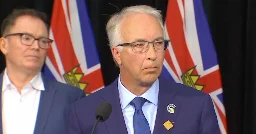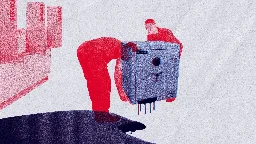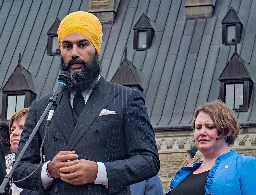Miez - a crowd pleaser like pizza. I like it when she moves her arms to gesture "scritch here, please." She's so relaxed ❤️
The bike lanes are pretty long and extensive because they wouldn't be an attractive traveling option otherwise. The job will require planning of how to 'renovate' in addition to the actual roadwork. $48 million doesn't really surprise me. Ford's idea isn't about fiscal prudence or easing traffic, it's about appealing to suburban and rural voters and Ford trying to build a highway and circumvent opposition to do so: https://thenarwhal.ca/ontario-highway-413-bill-explainer/
WTF, why only 1 game? What's going on, Adam?
Lotsa injured teams. Adam Silver specialty. Lol jk but 🧐...
I don't have time to read the article right now unfortunately, and have only glanced at it, but anyone not concerned about the global rise of authoritarianism isn't paying attention. Based on my glances, I thought the commenters disparaging the Tyee read less of the article than me. I think we're seeing a post-election uptick in US commenters making US-centric comments on Canadian news article posts on lemmy.ca. When they're relevant or thoughtful, I don't mind. I hope to read this slightly dated, but perhaps more relevant now than before, article later
I don't see where the article says PP is a threat to democracy...
Fair, but at least they're reporting it and connecting the dots re: this tesla safety issue, which I haven't seen from any legacy media
Four people died after a Tesla crashed and burst into flames, while a fifth person narrowly escaped after a bystander broke open a window.

This happened in Toronto on October 24th
Dame is out with a ref-caused injury. Dame was looking the other way and sustained a minor eye injury, I think, when he walked into a ref waving his arms outwards to indicate "no basket". Arguably Dame wasn't paying attention, but the idea of a ref-caused injury is pretty novel
Bucks are in black uniforms on a blue court obviously
It's not just about the bike lanes. The bike lanes removal is part of a bill ford is using to build a highway. I'm not sure how much the bike lanes bit is a distraction from him circumventing opposition to a highway he wants to build. I definitely think the bike lanes removal is an issue, but it's not the full picture of ford's latest effort to @#$ the people of Ontario over, which we shouldn't lose site of.
https://thenarwhal.ca/ontario-highway-413-bill-explainer/ (bold mine):
If built, Highway 413 would run through Ontario’s Greenbelt, prime farmland, wetlands, woodlands and waterways, connecting suburbs north and west of Toronto. Ford’s Progressive Conservatives have been trying to build it since 2018, and won re-election in 2022 on promises to deliver on the highway. But the process has been bogged down by intervention from the federal government — plus backlash over the 413’s environmental impact and the well-connected developers that stand to benefit from its construction.
Six years later, with shovels not yet in the ground and the premier hinting at an early election, the government is now making another attempt to hit the gas pedal. It’s selling the new legislation — which also includes measures to restrict bike lanes — as a way to solve the Greater Toronto Area’s traffic woes, despite years of evidence showing new highways don’t relieve congestion and bike lanes don’t cause it.
The COP conferences nowadays are O&G industries cosplaying social responsibility as a self-serving delay tactic
The privacy violations seem egregious to me. Then there's the fact that this bill will secure pensions for 80 politicians by pushing the next election back a week. Why doesn't the electorate trust politicians more? /s
I think political parties love where politics is at. It's become about data collection and copious personalized advertising to 'key voters' (ie, small groups of voters that heavily and unfairly sway overall results in first-past-the-post style elections). Policy and party identity are passé and not as easy to game the system and be reactionary with. It's easier to buy votes (via personalized advertising) than it ever was before this era of social media saturation, I think.
I'm in my 30s and I reject these sort of privacy violations (and freedom of reach), in part because I remember how much ownership and privacy consumers used to enjoy. Now, we can't access many services without handing over gobs of our data, and because we often pay for licenses versus actual goods (eg, netflix) we are at the whims of companies when they want to change their services, increase fees (eg, surge pricing), or change end-user agreements.
I make a point of my age, because when I talk to people in their 20s and younger, they often don't see things like I do; my privacy-centric views seem strange to them. For people who've experienced puberty and onwards with multiple mainstream social media platforms, they seem to regard this relationship with products and companies as completely normal. Good news for the oligarchs.
Why do you think a union would be involved in moving stolen vehicles, especially in any sort of decision-making capacity (ie, deciding to support this type of crime)? Is there any evidence to support your allegations of criminal activity?
Thanks for posting this. I think you're right. I was getting bad-reddit-like vibes from the recent AMA posts. One thing I like about the fediverse is how real posts and comments are (compared to corporate-controlled social media)
I switched to Coextro after getting fed up with similar price gouging from Koodo. Coextro uses a 3rd party for their billing, which I don't love, but I pay $81.30/mo for mobile service and home internet (combined) without a contract
In a very superficial way, yes; in a meaningful way, not at all imo. In response to Black Lives Matter, "all lives matter" was a way of delegitimizing a marginalized group's fight for justice and equality. Recognizing all victims of war and not strictly NATO soldiers (ie the red poppy) is about including more marginalized people in our memorializing, not fewer. It's quite opposite to "all lives matter" actually
Yeah, that's a real bummer, the disappointing results on a Grey Cup host year. I was expecting to see another Lions v Bombers final this year
This happened in Canada, not the US, but I agree with the US healthcare issues you mentioned
"This doctor billed the Ministry for over 23,000 vaccines over 5 days, incorrectly billing the Ministry for $630,000, 21 times their eligible payments."
Those vaccines were not administered by her or her staff, but by local medical students, and not in her office, both of which apparently go against billing codes.
I'm not sure I agree with seizure of all funds here, and the vaccine clinics did good, but I think the doctor intended to misuse billing codes and I understand why the Ministry wants some money back. There should have been more communication and compromise earlier on. Like, if a doctor bills the province for $100,000 for a day's services that should raise a flag
CFL Division Finals head to Montreal and Winnipeg
The Canadian Football League Division Finals are set for Saturday, November 9 in Montreal and Winnipeg.

(If you don't want to see CFL/football stuff in your feed, plz block the community [vs downvoting the post] :)
Eastern division Saturday, November 9, 3 p.m. ET - Toronto Argonauts @ Montreal Alouettes
Western division Saturday, November 9, 5:30 p.m. CT/6:30 p.m. ET - Saskatchewan Roughriders @ Winnipeg Blue Bombers
The victors will meet in Vancouver at BC Place in the 111th Grey Cup on Sunday, November 17 with kickoff slated for 6 p.m. ET.
"Act like you've been there before" 😅
"Act like you've been there before" is a cliché I've heard that means to behave in a situation that is new and exciting to you as if it is something old and familiar to you instead.
As a closeted transfeminine person, I'm thinking about painting my fingernails black - wearing coloured polish in public would be a first for me. And I'm thinking of getting them done at a salon - another first.
I'm so nervous but excited. I know from experience of rocking neutral or clear polish as a cis-looking AMAB person that being super nonchalant about having painted nails in public will lead to me having a better time, which is ironic because rocking painted fingernails in public is like bucket list-level excitement for me. But to assuage my high levels of social anxiety and increase my odds of having a good time, I know I ought to be nonchalant or "act like I've been there before." It's kind of humorous to me, even though I obviously don't think there should be any stigma at all.
The more I dwell on this, the more I realize it's important to me and I should do it. Gotta gather my courage tho! 😅
Cows watching the northern lights


https://mstdn.social/@ElleGray/113272986345873402 (photographer: @ChrisReichert3 on twitter)
"They're trying to kill us" (2021) is now available on many corporate streaming services
I'm on a mailing list and got an email that read > We’re super excited to announce that They’re Trying To Kill Us is now on Apple TV for download or rental, and streaming for FREE on Roku, Tubi and Youtube’s official movie channel
I watched it a year or two ago. It's more about anti-Black food and environmental racism in the US than it is about veganism per se, but I found it a highly edifying vegan-ish video.
https://www.theyretryingtokillus.com/ > They’re Trying to Kill Us is a new groundbreaking documentary from Executive Producers seven-time NBA All-Star, Chris Paul and 7X Grammy winner, Billie Eilish.
> The film features notable influencers from the fields of Hip Hop, medicine, sports, entertainment, policy, and politics weighing in on the singular most deadly threat to American society that mainstream media doesn't want to talk about.
Recyclable trash is just being dumped in a private open lot.

Vote Vets released this devastating ad calling out Donald Trump for his debacle at Arlington National Cemetery
https://mstdn.social/@DemocracyMattersALot/113063952703333947 > BREAKING: Following Donald Trump’s debacle at Arlington National Cemetery, Vote Vets released this devastating ad calling out Donald Trump for his BS. Retweet to make sure all Americans see this.
Click link for video (1 min, 33 secs) hosted on a Mastodon instance
Canadian government-funded think tank attacks The Canada Files and Daniel Dumbrill
Written by: Aidan Jonah A think-tank funded by the Canadian, American and multiple European governments , along with Open Society Foundations , has attacked The Canada Files and Daniel Dumbrill for our dual-support for China and Palestine. The Institute for Strategic Dialogue (ISD)’s report im

The Canadian government is spending money to attack rigorous journalists who partially dissent with Canadian foreign policy (e.g., Israel and Co's genocide) and to call them Chinese state-affiliated news outlets.
I already had strong suspicions the Canadian government was employing associations with China as pretext to disparage and censor dissenting ideas, people, and platforms. This is strong evidence.
I wish our government focused more on governing based on public wants and needs and less on covering up governance that goes against or that is morally bankrupt or corrupt
BC Conservative leader John Rustad was expelled from the BC Liberal Party in 2022 over controversial views on climate science

> The BC Conservative party’s official “climate policy” explicitly rejects the idea that climate change is a “crisis.”
> In August 2022, Rustad retweeted a tweet from prominent climate science denier Patrick Moore casting doubt on climate science.: “The case for CO2 being the control knob of global temperature gets weaker every day,” said the tweet amplified by Rustad, adding that people should “celebrate C02.”
Gas giant Enbridge is receiving millions of dollars of new federal funding to help build Canada’s hydrogen economy - a "slap in the face" for some.

> Several million spread across a handful of projects may seem like small potatoes compared to other federal financing worth hundreds of millions, but Alex Cool-Fergus, Climate Action Network Canada’s national policy manager, is frustrated to see the federal government pump any money into the hydrogen sector. In an interview with Canada’s National Observer she called hydrogen an improbable “techno-fix” that has been effectively marketed by the fossil fuel industry.
> The possible end uses for hydrogen are dwindling, which is eroding its forecasted demand. To put in perspective just how significant this is, four years ago Natural Resources Canada expected the global market could be worth up to $11.7 trillion, but now says it could be worth up to $1.9 trillion — an 84 per cent drop.
> “It's disappointing to see that the federal government continues to invest in this false solution, and that disappointment is amplified by the fact that some of this money is going to massive companies that don't need any more money,” she said, calling it a “slap in the face.”
> “If [fossil fuel companies are] going to be investing in this at all, they should be using their own profits.” Last year, Enbridge posted $5.8 billion in profit and greenlit $10 billion worth of new projects.
One of 39 nations that pledged to end non-domestic support for fossil fuels at the COP26 climate change conference in 2021, Canada spent $6.75-billion less last year backing new sector projects, according to International Institute of Sustainable Development

> Export Development Canada (EDC) and other national crown corporations have provided $7.6 to $13.5 billion a year between 2020 and 2022 to support the domestic fossil fuel industry, as compared with just $147 million for in-country renewable energy production, number-crunching by the IISD revealed in June.
> Canada was criticized in the new report for a “lack of transparency in reporting” that made it hard to ascertain whether finance was going to domestic or international markets. EDC data shows it has provided $88 billion to the oil and gas sector since 2016.
Jagmeet Singh and the NDP sit in the shadow of the Liberal Government, caught between criticizing those in power while also attempting to claim agency over bills being passed.

> Today, the NDP sits in the shadow of the Liberal government, caught between criticizing those in power while also attempting to claim agency over bills being passed. Most peculiar of all has been Singh’s retreat from online spaces. In 2023, he deactivated his TikTok account citing privacy concerns, but the shift in the tone of his content went beyond that.
> His once fresh, relatable, curtain-tearing content had been replaced by generic campaign videos of Singh reading scripts word-for-word that feel like they were copied directly from the platform section of the NDP website. It became boring, uninspired and — most importantly — ineffective. Polls now project a loss of seats for the NDP in the next election.
> One thing is for certain: we are closer to a Singh exit than we are from his arrival. Come October, he will have been party leader for seven years — he will certainly not be leader in seven years. So, has his choice to abandon his online roots damaged the future of his party?
> Whatever the future of the NDP holds and whoever its next leader will be, it is clear that it remains a party in desperate need of reimagination — the exact same issue that Singh was brought in to solve.
If plans to expand carbon capture technology are pursued, it will mean a network of hundreds, if not thousands, of kilometres of concentrated CO2 pipelines running under communities and Indigenous nations, demanding increased attention paid to these emerging risks.

This is an aspect of the carbon capture greenwashing initiative I wasn't aware of. It will need another pipeline network that can be very costly to human and environmental health (and operated by an industry that our government is willfully blind to).
> Carbon capture is becoming a linchpin of Canada’s plan to reduce emissions from its oil and gas sector, but to pull this plan off would require massive investments in necessary infrastructure: pipelines, pressurization stations, equipping carbon capture to bitumen upgraders and more, all of which could fail. In a carbon management strategy, released in 2023, the federal government says to support the country’s emission reduction efforts, carbon capture capacity must grow 270 per cent from current levels by 2030, with “significant further scaling required” to reach net-zero by 2050.
> when carbon dioxide pipelines fail, they can fail catastrophically.
> According to data from the U.S. Department of Transportation, there have been at least 76 reported safety incidents related to CO2 pipelines since 2010 in the United States. Some incidents are minor and others are disastrous, but all point to the risks of transporting and storing carbon dioxide as a way to manage greenhouse gas emissions.
> Dodging a full assessment
> By far the largest project would be the Pathways Alliance’s $16.5-billion flagship carbon capture project, which would include a carbon dioxide pipeline stretching 400 kilometres from the oilsands in northern Alberta to a storage hub about 300 kilometres east of Edmonton.
> The Pathways Alliance is splitting its megaproject into 126 smaller segments, with multiple applications for various licences with the AER. As previously reported by Canada’s National Observer, that means the project won’t be subject to a full environmental assessment that examines what the impact of the project in its entirety would be. “The impacts are never being articulated to the public, and that includes impacts on the environment, the climate and Indigenous rights,” said Matt Hulse, a lawyer with Ecojustice collaborating with the Athabasca Chipewyan First Nation to call for an impact assessment.
Years after Ontario's premier promised 1.5 million net new homes by 2030, his government's own NIMBY zoning, outdated construction rules and subsidies for inefficient sprawl development have prevented both market and non-market builders from making shifts to more labour-efficient building formats an...

> So why, years after the Premier promised legal reforms that would deliver “more homes faster” and 1.5 million net new homes by 2030, is the housing shortage even worse? Why are housing starts actually down, year over year? It’s because rather than ending restrictions on midrise housing and slamming the brakes on sprawl and highway schemes that squander construction, Ontario’s changes to land use planning, environmental and transportation laws and policies have done the opposite.
> Soon after Premier Doug Ford took office, his government began to dismantle even the modest measures the previous government had taken to promote more efficient housing construction.
> Despite calls from housing and environmental experts across the political spectrum — and its own housing task force — to scrap outdated rules such as minimum parking requirements and to permit mid-rise housing on major streets throughout existing residential neighbourhoods, Ford intervened. He personally blocked efforts to legalize even 4-storey “4-plex” apartment buildings.
> In recent months, as his government’s failure on housing has become more obvious, Ford has tried to pass the buck by blaming everyone from immigrants to the Bank of Canada. What he glosses over is that the housing market could easily have adapted to population and rate changes, but has instead turned the challenge of high interest rates and the opportunity of a growing population into a housing crisis by willfully sabotaging the solutions.
Doug Ford's new drug policy is already a failure
> It’s generally fair to wait for a policy to unfold, to leave some time to judge its effects, before we decide whether it will succeed or fail. The Ford government has done its critics a favour this week, however, with its announced changes to drug policy in Ontario, shutting more than half of the province’s safe consumption sites. The logic adopted by the government and its defenders is that because the province’s overall high rate of opioid deaths has continued, these safe consumption sites are a failure. This is despite the fact that no patient has died of an overdose at these sites precisely because they’ve been monitored and treated.
> The bad news for the government, and the good news for its critics, is that if the benchmark for success is "reducing the rate of opioid overdose deaths in Ontario” then nothing announced this week will succeed. That’s not because an emphasis on treatment over harm reduction is itself indefensible. It’s because the scale of the problem that Ontario faces is so far beyond the resources that have so far been committed, and because addiction itself is such a wicked problem for health policy.
Ontario’s best recycling program is already falling apart. What comes next?
> For nearly a century, the Beer Store has, in one form or another, operated arguably the best-performing recycling program in the province of Ontario. Its deposit-return system — which sees consumers get refunds of 10 or 20 cents per container returned to the stores — boasts a return rate of nearly 80 per cent overall, and for some specific types of containers, the number is higher still: 89 per cent of glass bottles were returned in 2022, according to the most recent environmental-stewardship report on the Beer Store’s website.
> The success of the deposit-return scheme, which has been expanded to include wine bottles and other alcohol-beverage containers, stands in stark contrast to the middling diversion rates achieved by the blue-box program operated by many municipalities. The city of Toronto, for example, achieved an overall diversion rate of just 53.6 per cent in residential collection, and even single-family homes (which perform better than the city’s older apartment buildings) rate only 63.9 per cent. The numbers provincewide aren’t any better overall, and a report from the province’s Resource Productivity and Recovery Authority suggests Ontario’s diversion rates have actually fallen over the past decade.
> So the closure of Beer Store locations in small northern communities poses a problem that, at least in some cases, is going to fall on the property-tax bill of local homeowners.
> “As a municipality, we now are going to be stuck having to pick up everyone’s empties, and it’s going to impact our landfill space. It’s going to end up in the pile at the front of everyone’s driveway on garbage day,” McPherson says. “We are in the process right now of applying for an environmental assessment for new waste management because the Geraldton landfill is full. This is absolutely the wrong time for us to have excess material going into the landfill.”
> Greenstone isn’t alone: Beer Store locations in Nipigon and Cochrane are also reportedly closing in September. In at least some cases, the Beer Store’s former customers will still be able to get beer at an LCBO or a new outlet such as a corner store or gas station — but locals will have nowhere to return empties.







